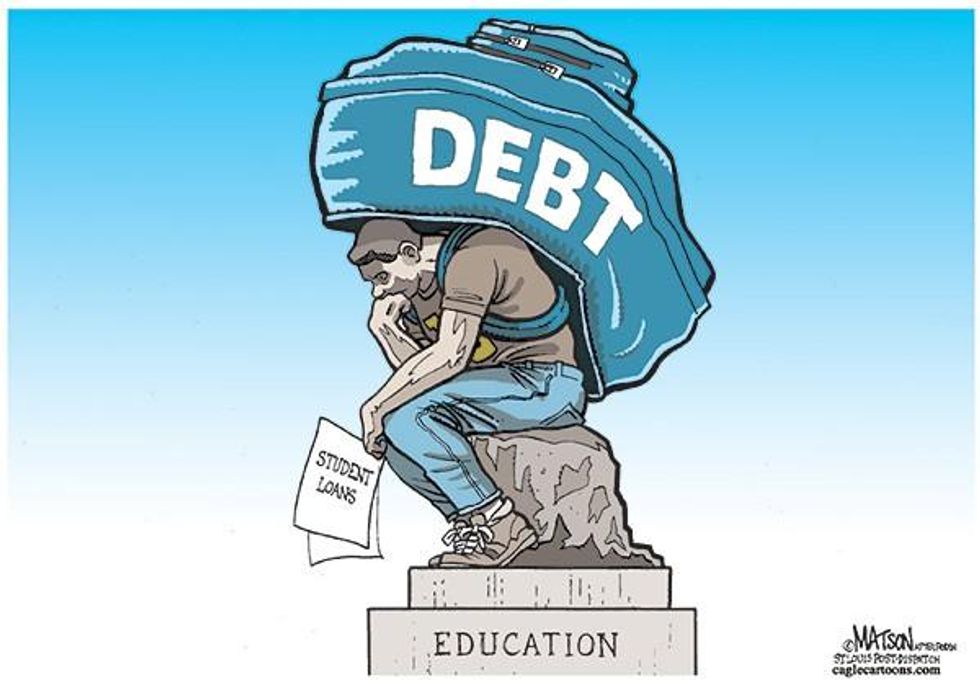President Obama doled out the most shocking stream of commencement cliches to the graduating class of Barnard College Monday. To offer just a taste:
"The question is not whether things will get better -- they always do... The question is whether together, we can muster the will -- in our own lives, in our common institutions, in our politics -- to bring about the changes we need. I'm convinced your generation possesses that will."
Whatever else they possess, the class of 2012 possesses an enormous amount of debt. Heavy borrowing's not only for graduate students or drop outs from for-profit colleges any more. It's also for Barnard alums. Forty eight per cent of those graduating this year from Barnard (where the price tag of an education stands at $58,078 ) have taken out loans to pay for their bachelor's degree. As the New York Times recently pointed out, "Nationally, ninety-four percent of students who earn a bachelor's degree borrow to pay for higher education -- up from 45 percent in 1993." For these students things aren't getting better, they're getting worse. Their will has nothing to do with it.
Standing at $1 trillion and rising fast, outstanding student debt is a bubble set to burst. The New York Times report compiled shocking numbers: "For all borrowers, the average debt in 2011 was $23,300, with 10 percent owing more than $54,000 and 3 percent more than $100,000." Not just the students but also their parents are borrowing. Loans to parents for the college education of children have jumped 75 percent since the 2005-2006, according to the Times.
Just like that first home, millions spent on marketing have made a college education seem like an American must-have. Yet ever since the early 1980s, college tuition has risen faster than wages, and public education spending's been cut back. As the Times reports: "If the trends continue through 2016, the average cost of a public college will have more than doubled in just 15 years," even as this year, "state and local spending per college student, adjusted for inflation, reached a 25-year low."
If you liked the mortgage crisis, you're going to love the education debacle. College admissions officers, like mortgage loan officers, tend to urge borrowers not to worry about the costs. Students have always defaulted. The federal government's pre-approved the bail-out. Today, nearly one in ten students default within two years - about twice what it was five years back. Consumer bankruptcy lawyers have been raising an alarm for a while.
"Take it from those of us on the frontline of economic distress in America," said William E. Brewer Jr. of the National Association of Consumer Bankruptcy Attorneys earlier this year. "This could very well be the next debt bomb for the U.S. economy."
Except it's a different sort of debt bomb. It's the sort that individuals have to care about. Thanks to federal law, there's no declaring bankruptcy on student loans and there's no debt relief. There's no getting a refund for an education that did you no good. At the end of the day those payments can be drawn directly out of your social security check. Pam Brown, a Columbia college graduate student, is working with the OWS based group, Occupy Student Debt. "The system is a predatory one," she says. "There's an assumption students won't be able to pay their debts. Refinance, take out an expensive private loan and the interest rates compound fast." As Brown says: "the government and the banks both had their hands in this pot."
This particular bubble doesn't burst on Wall St. "It oozes over a generation," says Brown. "In a sense it's a pre-approved government bailout. The government protects the college, but each debtor is paying so much throughout their lives that it's impossible to live a regular life." Says Brown.
One last turn of the knife: predatory lending patterns are re-inscribing the racial divides that President Obama's happy talk about social change would let so many Americans forget.
"Whenever you feel that creeping cynicism, whenever you hear those voices say you can't make a difference, whenever somebody tells you to set your sights lower -- the trajectory of this country should give you hope." Said the president.
The reality is, today's trajectory is towards ever greater divergence, rural from urban, the very rich from the rest, but especially black from white.
ColorLines fills in what the New York Times leaves out: whereas about one in four white Americans graduate with debt less than $12,000; one in three African Americans owes more than $38,000. (The Barnard graduating class is just 4.5 percent African American.) The same phenomenon we saw in the housing crisis prevails in education: it's perilous to be "borrowing while Black."
Just as black borrowers were more likely than whites to be offered risky, sub-prime mortgages (even when they could afford regular sort) so too, Black students are more likely than any other group to take out high-risk private loans for college. Private loans (which are on the rise) come with none of the deferments for unemployment, income-based repayment, or loan forgiveness options attached to federal student debt. According to the Project on Student Debt the percentage of African-American undergraduates who took out private loans quadrupled between 2003-04 and 2007-08, from 4% to 17%. The next batch of numbers are sure to be worse. Suffice to say, having lost all the wealth they gained subsequent to the Civil War in the housing disaster, the options for the next African American generation are quite literally being cut off.
Barack Obama said at Barnard:
"If you're willing to do your part now, if you're willing to reach up and close that gap between what America is and what America should be, I want you to know that I will be right there with you. If you are ready to fight for that brilliant, radically simple idea of America that no matter who you are or what you look like, no matter who you love or what God you worship, you can still pursue your own happiness, I will join you every step of the way."
Sometimes commencement cliches are just dull. At other times they hurt. "Joining with" today's graduating class requires forgiving student debt. For all our sakes. Nothing else counts.



